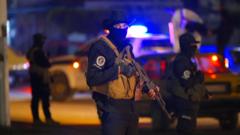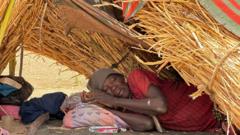An accused participant in recent sectarian violence against Alawites in Syria claims he was guided by security forces. Eyewitness testimonies indicate that hundreds were killed in a retaliatory outbreak following insurgents' attacks, exposing the fragile balance of power within the country.
Testimonies Reveal Sectarian Violence Oversight in Syria's Coastal Region

Testimonies Reveal Sectarian Violence Oversight in Syria's Coastal Region
New accounts from survivors and perpetrators reveal complex dynamics during recent violence against the Alawite minority in Syria, underscoring deep-seated sectarian tensions.
One of the men accused of involvement in the recent sectarian violence directed at Syria's Alawite minority has claimed he was supervised by security forces while carrying out attacks. Abu Khalid, a civilian fighter, recounted his journey to the Mediterranean village of Sanobar on March 7, where he, along with armed groups, targeted what they believed were insurgents linked to the former regime.
"The General Security department instructed us to refrain from harming civilians, aiming only at insurgents," he stated, though he later recorded himself shooting a local resident, Mahmoud Yusef Mohammed, at point-blank range. While Khalid claimed the victim was armed, video evidence contradicts his assertion, leading to his subsequent arrest.
The UN estimates that nearly 900 civilians, predominantly Alawites, were slain as violence erupted along Syria's coastline in early March, further exacerbating existing sectarian tensions. The Alawite sect, an offshoot of Shia Islam, constitutes about 10% of Syria's population, which is primarily Sunni, and survivors attribute their persecution to systemic discrimination linked to the former Assad regime.
Witnesses from Sanobar describe harrowing accounts of armed groups executing civilians in a retaliatory surge following attacks on government forces. Those who dared to escape were often aided by the very security personnel purportedly tasked with protecting them, reflecting a complex web of alliances and hostilities.
Long-standing grievances stemming from Assad's oppressive government have intensified sectarian passions, leading to indiscriminate violence against the Alawite population. As the dust settles and survivors struggle to rebuild their lives, the presence of government and militia forces remains fraught with tension, with each side grappling with the ghosts of the past.
With a new government vowing accountability, many Alawite villagers are urging stronger protective measures. The fate of these communities symbolizes not just the immediate aftermath of violence, but also serves as a litmus test for Syria's broader future and the treatment of its minorities amid an evolving political landscape.





















